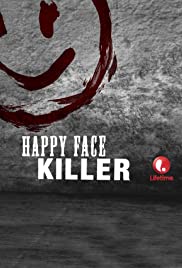
HAPPY FACE KILLER
US, 2014, 83 minutes, Colour.
David Arquette, Gloria Reuben, Darrell Shuttleworth.
Directed by Rick Bota.
American udiences seem to have a steady appetite for feature films exploring the psyche of serial killers while showing them in action, their external manner, their interior psychological struggles.
This is a brief film, based on fact, showing some of the serial killings of Keith Jespersen and trying to give some dramatic interpretation of his psyche, the difficulties of his upbringing, his moods and angers, sexual behaviour, his defiance of the authorities, his signature happy face drawn on the victims.
David Arquette is a smiling villain, initially charming, even seductive, but becoming angry with his wife leaving him and taking the children, his spending a lot of time on the road as a truck driver, taking on extra work, picking up women at diners – and the dramatising of several of his murders and disposing of the bodies in ditches in the countryside.
Commentators note that the FBI was not initially called in and a lot of the investigations were done locally. However, Gloria Reuben portrays a seasoned FBI agent who tracks the killer and eventually confront fronts him.
The screenplay was written by Richard Christian Matheson, a seasoned author of fantasy and horror stories, the son of the celebrated novelist and screenwriter, Richard Matheson.
Clearly, not a profound psychological exploration of the mind of the killer but a dramatisation of who he was, how he operated, and suggestions to understand his character and state of mind.
1. A drama based on facts, an actual killer, serial killer? The dramatising for a brief feature film?
2. The North Western states, homes, diners, the roads, the open countryside? The musical score?
3. The portrait of Keith Jespersen, as played by David Arquette, the happy face? The introduction, cheerful, driving, his boss, always on the road, the note from his wife, separation, taking the children? The effect on him?
4. The interviews with his brother, the background of their childhood, the discipline of their father, Keith and his tormenting the animals? His moods?
5. The marriage, Keith’s wife, his visits, wanting to see the children, bringing presents? Her being unwilling to return?
6. The gradual revelation of his moods, tantrums? Yet keeping the happy face? The driving? The visits to the diners? Friendly?
7. The dramatisation of picking up the girl, her being very forward, taunting him, his killing her? Taking the body, the burial? The discovery of the body? The further encounters with the women, picking them up, sexual activity, the murders, disposing of the bodies? The difference with the woman with her baby, his letting her go? Her giving information about him?
8. Local investigations, the calling in of the FBI, authority and jurisdictions? The reaction of Sheriff Cotton and his staff? Melinda Gand and her reputation, her taking charge? The eventual collaboration between the FBI and local jurisdictions?
9. The case of the woman claiming that her boyfriend was the murderer and that she assisted? Her scenario, the investigations? Confessions? The role of the district attorney, Melinda gained and her representations? Her continuing to investigate?
10. The media, the reports of the confession? Keith and his reaction, his angers? His sending letters? His being ignored? Melinda Gand and her suspicions, interviewing him, his smiling denials?
11. The signature of the happy face, drawing it on the bodies, the distance face with a stone surrounding the body, his letters? His knowledge of details?
12. His brother’s observations? Other witnesses? The background of the murdered women? His overstepping his mark, caught, the collaboration of the boss of the trucking company, Melinda Gand and her confrontation?
13. A brief film, the possibilities for exploring the psyche of the serial killer, some simplifications for the drama?